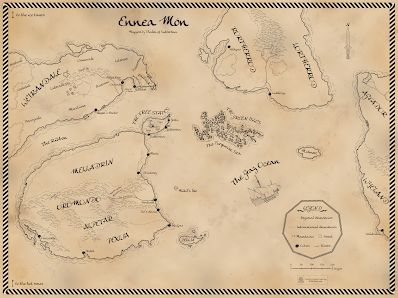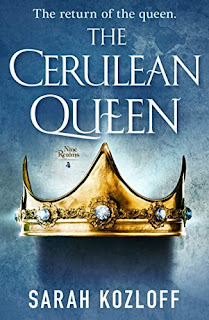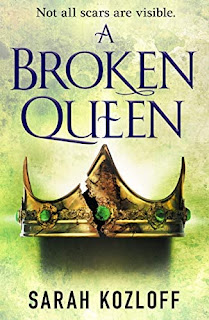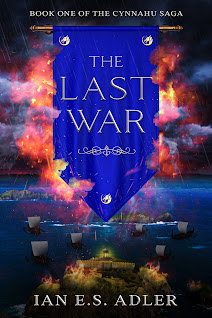Okay, so a couple weeks back (more or less) I posted the about the third Editorial Review of my book The Last War (The Cynnahu Saga Book 1) done by Literary Titan. Well, Literary Titan always interviews the authors whose books they review, so below is mine. Here is a link to the actual interview on their website if you prefer.
To Create My Own Earthsea
The Last War follows
five heroes as they embark on dangerous quest to rediscover the secret
of the Elder Song. What was the inspiration for the setup to your story?
Strange as it may seem, I found out
about the Elder Song a bare moment before Loremaster Aneirin did. I knew
from the start that the five were going to summon the power of the
Dragonkin using the Shrines, but how they were going to achieve that –
i.e. the setup – was a mystery to me until a heartbeat before Aneirin
heard of the Elder Song. However, while the setup came organically in
that sense, the Cynnahu Saga itself is directly inspired by the late
Ursula K. Le Guin’s Earthsea Cycle; in short, her Archipelago inspired me to create my own.
I remember first reading The Earthsea
Cycle in elementary school, hearing the mage Ogion of Re Albi say “To
hear, one must be silent.” And I still remembered those words when I
took the series up for a second and third time, years later. While the
rest of my generation went to Hogwarts with Harry, I traveled by ship to
the School of Roke with Ged.
Isn’t that interesting? I openly and
sincerely adored Middle-earth and idolized the wizard Gandalf, but it
was Ogion the Silent who I related to: “He spoke seldom, ate little,
slept less. His eyes and ears were very keen, and often there was a
listening look on his face.” I also remember being struck with the fact
that Earthsea was an Archipelago, the first I had ever encountered in a
Fantasy, with no true main continent to journey across; rather the
journeying was done by ship, in the soul, and on different Isles each of
which had a special distinction – its own personality, if you will. I
was so struck that even at so young an age I decided that if I were ever
to write a Fantasy book then it would take place upon an Archipelago. I
knew I wanted a mages’ school, a ruling Archmage, and ships.
Interesting is it not? I idolize The Lord of the Rings, yet never felt the need to create my own Middle-earth.
Your characters are all unique and detailed. What were some driving ideals behind your character’s development?
Most simply came to me, cliche as that
sounds. However, I tried to have them represent something I felt needed
a voice. Archmage Hoth is my idea of an ideal leader. Myrriden is a
single father who is not afraid to show how much he loves his son and
surrogate daughter. He represents rank, power and skill coupled with
humility. Emrys is not unlike myself at his age, nervous and following
the rules fervently, yet possessing an inner flame and smarts. He is not
the stereotypical brash “boys will be boys” hothead and is instead
deeply thoughtful. Sakura is a girl who had everything she loved taken
from her in an instant, and now seethes with a need for vengeance. She
represents trauma that takes time to heal but is smart and would fight
to the death to defend her still living friends. Volcan is the
mysterious and unwillingly funny figure you can utterly trust and who
keeps surprising you, because every good Fantasy needs such a character.
Stormlady Mica leads the blue warriors
because I have noticed that, in Fantasy, women tend to use their wits
and magic while the men lead the actual glorious cavalry charge; women
have the special powers while the men use swords. This is hardly an
ironclad rule and, even if it were, there is nothing wrong with it –
indeed I love countless books that employ this storyline tactic. But I
wanted to flip the coin. I wanted a woman wearing armor and leading the
land’s most elite warriors into white-hot battle while the men wrestled
with matters of magery.
Loremaster Aneirin in the scholar in
me, for I love historical research and adore archeology. Yet just as
much he – and the grey nobles in general – portray my firm belief that
the best societies are deeply aware of their own history and learn from
their past. Instead of trying to gloss over or justify the genocide of
the Dragonkin, most modern Cynnahu folk – thanks to the Loremasters –
are appalled by their ancestors’ deeds. Furthermore, I prefer wars won
in ways beyond mere military tactics and/or magic as otherwise it is
boring. Which is why Aneirin uses his scholar’s training to unravel
ancient mysteries, his work being crucial to the war effort and the
quest for the Elder Song despite never fighting.
Did you plan the story before writing or did it develop organically while writing?
A bit of both. I had what I like to
call beacons – major events I wanted to happen because they were turning
points in the story – but getting there was up to me. I was like a ship
captain sailing unknown waters towards the distant lighthouse then,
upon reaching it, setting out for the next. So I planned the story
insofar as the beacons went, but everything in between developed
organically while writing.
This is book one of The Cynnahu Saga. What can readers expect in book two?
Book two, Dragon Guardians,
will hopefully be out by this time next year. Hopefully. I am making no
promises as life has a horrid habit of getting in the way, but the book
is fully written – meaning all that remains to be done is editing.
Indeed, even the rough draft of book three, Mages’ Legacy is complete.































